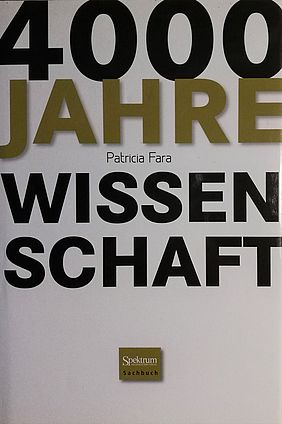The present volume was translated to German by Andrea Kamphuis.
Fara, Patricia: 4000 Jahre Wissenschaft. Heidelberg: Spektrum Akademischer Verlag, 2010.
The book is divided into seven sections, each again with seven sub-sections. In principle, the author considers the figure seven being attached with a special historical significance. Her history begins with the origins of science in the fertile crescent, continues with cultural interactions between Eurasia and Africa, it explores experimental methods in the third section, and then examines societal factors. In the fifth section, it examines historical, scientific, epistemological and socio-theoretical principles. Then Patricia Fara describes modern achievements and puts the reader in the seventh section before scientific critical decisions regarding warfare, environment, cosmos and the future of the sciences in general.
In the end, this four-thousand-year spanning history also challenges the absolute sovereignty of natural science when it provokes the question of whether science was so successful, not because it had always been right, but because man always maintained saying that science is right.
And consequently, right at the beginning of her book, Fara connects the question of where and when science would start with the relativistic remark that any answer to that would depend on any other individual definition of science itself.
Patricia Fara's work is a well-founded and refreshing narrative about the history of science which I warmly recommend.
